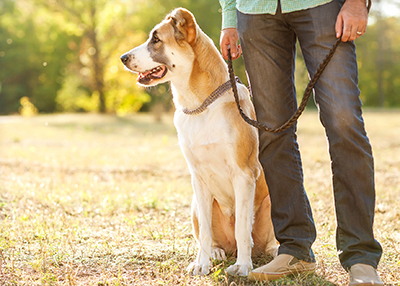Leading the Way to Well-Trained Dogs
Earlier this spring, we had a visit from the most surprising guest—I guess dogs were not aware of the “stay-at-home” orders in place. This adorable puppy was running around our neighborhood, darting across the street from one lawn to another. Thankfully, we were able to lure her over, scoop her up, and eventually find her home. The owner had been anxiously searching for Mishu. Relieved to have her back safely, he stated: “We got her to lift our spirits, but she needs to be trained; it’s scary each time she runs off.”
Numerous news reports cited 2020 as a banner year for pet adoptions.[1] Working from home and dealing with lockdowns, for many, getting a pet made perfect sense. Research on human-animal interactions is relatively new but has shown some positive health effects. Interacting with animals can decrease levels of cortisol (a stress-related hormone) and may lower blood pressure. Other studies have found that animals can reduce loneliness, increase feelings of social support, and boost your mood.[2] Owning a dog could go a step further, potentially improving your physical activity.
But what if your new dog becomes a source of added stress? Having it snap at people would be nerve-racking. Finding chewed-up shoes or toys will be frustrating. Or, in Mishu’s case, worrying every time they run off. Dogs need to be trained. After reading some great online reviews, I sat down with Michael Wilkes, founder of Leadership Based Dog Training.
 I was touched by how Michael got his start. His love for animals prompted him to volunteer at the SPCA. Of the many animals he helped with, one dog stood out: Wolf was physically out of control, aggressive towards other animals, and unresponsive to any type of intervention. Deemed much too hostile for adoption, he was scheduled to be transferred to another shelter, where he would spend six months locked up, and then be put down. Michael could not let this happen: “This was not the dog’s fault.” He stepped up and adopted him. Sadly, none of the trainers he went to could help. But he refused to give up on Wolf. He got to work figuring it out on his own. Among the barrage of well-intentioned advice and tools available online, he found some rare gems that worked. He refined these techniques to develop a unique approach. Three months later, Wolf was fully rehabilitated—and unrecognizable to those who had known him before. This altruistic experience turned into a new career, and Leadership Based Dog Training came into being. The following are some excerpts of our conversation.
I was touched by how Michael got his start. His love for animals prompted him to volunteer at the SPCA. Of the many animals he helped with, one dog stood out: Wolf was physically out of control, aggressive towards other animals, and unresponsive to any type of intervention. Deemed much too hostile for adoption, he was scheduled to be transferred to another shelter, where he would spend six months locked up, and then be put down. Michael could not let this happen: “This was not the dog’s fault.” He stepped up and adopted him. Sadly, none of the trainers he went to could help. But he refused to give up on Wolf. He got to work figuring it out on his own. Among the barrage of well-intentioned advice and tools available online, he found some rare gems that worked. He refined these techniques to develop a unique approach. Three months later, Wolf was fully rehabilitated—and unrecognizable to those who had known him before. This altruistic experience turned into a new career, and Leadership Based Dog Training came into being. The following are some excerpts of our conversation.
How Is Leadership-Based Dog Training Different?
Leadership Based Dog Training goes beyond just training the dog. We teach owners how to guide, communicate, and engage with the dog in such a way that ensures compliance regardless of any distractions. Working in real-world settings (with doorbell ringing, out in public, in dog parks, etc.) and showing owners exactly how to lead their dog in various situations is key to ensuring the dog understands the new rules being put in place. Knowing how to react frees the dog from fear, stress, and potential aggression. Once these new rules are in place, you continue to practice every day, so the dog continues to learn through repetition, further exposure, and desensitization. Clients are always amazed to see how quickly their dog’s behaviour improves.
When Is the Best Time to Start Training Your Dog?
Right away—unless the dog is less than eight weeks old. Do not wait to be on vacation, or when the kids are home from school: The sooner you start, the better.
Who Should Train the Dog?
Everyone who lives and regularly interacts with the dog, including older children. In addition, extended family, friends, and neighbours who visit should also be shown how to lead the dog. Too often, dogs are not desensitized to “new people,” which can cause fear, distrust, and nervousness. This is emotionally terrible for dogs and could develop into paranoid or aggressive behaviour. The more people you have “properly leading” the dog, the better. Consistency is key.
How Long Does It Take to Properly Train a Dog?
We see results within five minutes of starting proper training drills. You can expect a full transformation over the course of three to four personal training sessions, within a span of about seven to ten days. Online training also works very well, but it may take a little longer, as you need to go through the videos before starting, then refer to them as needed. Either way, it is crucial to continue to reinforce and maintain what both the owner and the dog have learned, on a daily basis.
What Are the Biggest Mistakes Dog Owners Make?
They underestimate the importance of the “leash in the house” to practice drills and exercises. We must stop thinking of leashes as control mechanisms only for the outdoors, and embrace them as training tools, especially in the house.
Anything Special to Consider When Adopting a Rescue?
People often put too much emphasis on the dog’s past circumstances. In reality, it does not matter. What does matter is learning how to transform the dog with solid leadership and proper boundaries to give it a better, happier life. Regardless of a dog’s current emotional state—be it anxiety, fear, or aggressive or out-of-control physical conduct—we help our clients transform their dogs to calm and confidence, and to regain control of themselves. With proper leadership-based training, everything can change.
 Leadership Based Dog Training is the only service I have seen offering a written money-back guarantee. It succeeds where others fail because, it addresses both the dog’s behaviour as well as the owner’s leadership skills. They offer in-person training in and around Montreal. They have also developed an online course, complete with close to 100 videos, so anyone can benefit from this great method.
Leadership Based Dog Training is the only service I have seen offering a written money-back guarantee. It succeeds where others fail because, it addresses both the dog’s behaviour as well as the owner’s leadership skills. They offer in-person training in and around Montreal. They have also developed an online course, complete with close to 100 videos, so anyone can benefit from this great method.
Michael is extending a special offer to Flourish readers this summer: Visit leadershipbaseddogtraining.com and use promo code FLRS2021A to benefit from a 50% discount for the online course package.
And I am happy to tell you that Mishu has started her training!
[1] Cousins, B. « ‘The reward is worth it’: For some pet adoption centres, 2020 was a banner year. » CTV News, 2020-12-21. · https://www.ctvnews.ca/canada/the-reward-is-worth-it-for-some-pet-adoption-centres-2020-was-a-banner-year-1.5226623
[2] Wein, H., éd. « The power of pets. » News in Health, 2018-02. · https://newsinhealth.nih.gov/2018/02/power-pets

 Stores
Stores